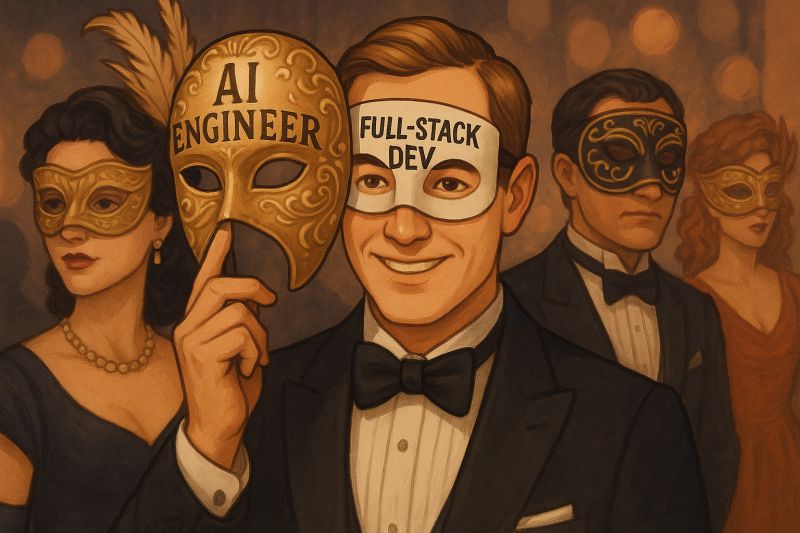Let’s be brutally honest: the job title “AI Engineer” is more marketing than meaning.
Ten years ago, “AI engineer” meant something specific. It meant diving into raw data, carefully crafting features, and training bespoke models from scratch. It involved wrangling with gradient descent, tuning hyperparameters meticulously, and occasionally producing something genuinely novel. It was messy, mathematical, and distinct from traditional software engineering.
But let’s cut the pretense: today’s “AI engineers” are essentially software engineers who’ve stayed current on the latest tooling. They’re building pipelines, integrating third-party models, writing clever prompts, and orchestrating APIs. The actual AI—the groundbreaking algorithmic breakthroughs—has largely been abstracted away.
There’s been a clear decoupling in the industry: most companies today are model takers, not model makers. Real AI innovation—developing novel models—is happening almost exclusively at research powerhouses. In fact, the vast majority of folks doing genuine “AI engineering” today are arguably the research teams at MOGA (Meta, OpenAI, Google, Anthropic)—the new FAANG of the AI era.
Modern AI engineers don’t typically create new AI models; they select them. They glue together existing solutions, deploy pre-trained models, and fine-tune systems using frameworks like LangChain, LlamaIndex, or Hugging Face’s Transformers. Even XGBoost—once cutting-edge—is now effectively part of the standard software toolkit. The role has evolved into something far closer to data engineering and pipeline management than to the original AI work of a decade ago.
Learning new techniques is par for the course for software engineers. Remember when React took off around 2015? Suddenly, people were branding themselves as “React developers,” but the ones who truly excelled were software engineers with a broader skill set. Today’s AI engineering boom feels similar. AI-focused bootcamps are a great way to kickstart or reskill a career—just like the Ruby on Rails bootcamps of the 2010s. They’re valuable stepping stones, but they mark the beginning of the journey, not the destination. FWIW I’m not dunking on bootcamps. I’ve hired plenty of folks from them who became strong engineers. I’m just arguing that learning to build with AI tools doesn’t make you a good AI engineer any more than writing JSX made someone a good React engineer. It’s far more complicated than that.
There’s nothing wrong with acknowledging that most AI jobs today require exceptional software engineering skills, combined with strategic decision-making around model selection and integration. But it’s dishonest—and arguably damaging—to pretend this is fundamentally different from good old-fashioned software engineering. The skills needed are software-first: designing systems, problem decomposition, coding, scaling, managing deployments, ensuring robust data pipelines, etc.
Consider your friends or colleagues who held titles like “Data Scientist” or “Head of AI.” Chances are, they’ve re-skilled. Not toward deeper theoretical AI or advanced math, but toward becoming better software and data engineers. They’ve adapted to a reality where the tooling and infrastructure around AI are far more impactful than tweaking models themselves.
If we’re honest, calling these roles “AI engineering” is primarily marketing. It inflates job titles, muddies expectations, and obscures the fact that real AI breakthroughs are rare. Most work labeled “AI engineering” today is just disciplined, modern software engineering with a touch of thoughtful model selection and prompt engineering.
Perhaps it’s time we drop the charade and call it what it truly is—just software engineering.
